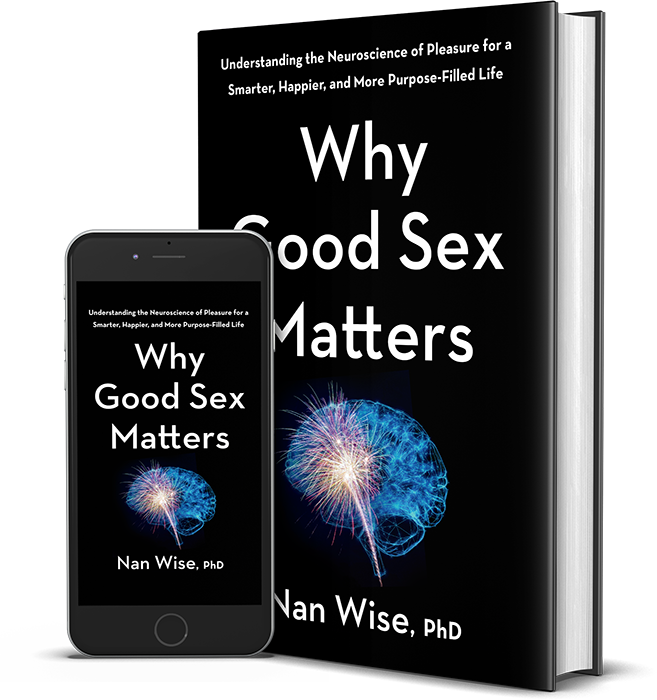In my practice as a certified sex therapist and in my work as a neuroscientist studying pleasure, there’s one question I hear a lot: Why can’t I orgasm?
6 Possible Reasons You Aren’t Able to Orgasm
Having a regular stream of orgasms isn’t just about having a good sex life; it’s about prioritizing pleasure—something that’s beneficial for our brains and bodies, as I discuss here in my book Why Good Sex Matters.
In this Article:
- You Haven’t Practiced
- You’re Dealing with Sexual Trauma or Shame
- There’s a physical Cause
- You’re Depressed or Anxious
- You’re Not Completely Comfortable with your Partner
- You’re too Stressed to Orgasm
In my past articles we have explored what an orgasm is and how it feels, as well as various types of orgasm (clitoral, nipple, and vaginal/cervical). Today, we will address one of the most urgent and common of concerns for which clients seek my services—usually expressed with a little embarrassment: “Why can’t I orgasm?”
Firstly ladies: It’s nothing to be embarrassed or ashamed about.
Getting reliable data about how many women suffer from orgasmic dysfunction, which is how difficulty having an orgasm is generally described, isn’t easy. There’s big variability in how dysfunction is defined, how questions are phrased, who is sampled, and other technical issues too boring to discuss.
But recent data indicate that 16% to 25% percent of women in places like the U.S., Australia, Canada, and Sweden, report these challenges. In other countries where cultural attitudes about sex are more negative, rates are significantly higher. (A whopping 74% of women in Ghana report orgasmic dysfunction, for example.)
When we’re examining intercourse, sex researchers say that 75% of women never reach orgasm from intercourse alone.
“Anorgasmia,” as it’s scientifically referred to, can be situational. You may be able to orgasm during certain circumstances—for example, when masturbating alone but not when your partner is present, or not during sexual intercourse. That’s pretty common actually—”mild” anorgasmia like this has been reported to affect up to 60 percent of women.
So what can you do about it? Let’s dig into the common reasons women can’t orgasm and how to address them.
1. You Haven’t Practiced
In my clinical work, I’ve found that for women who’ve never ever had an orgasm, the most common cause is simply insufficient practice masturbating.
Orgasm isn’t just the result of a glass of nice wine, a little Marvin Gaye, and some fairy dust; it’s a learned skill. I’ve studied the sensory pathways from the genitals to the brain’s pleasure machinery—connecting and strengthening them is what makes orgasms possible and easier to access.
Males appear to have an easier time discovering how to masturbate to orgasm than females. This may be in part due to biology—an erect penis is hard to ignore—in combination with a culture that more readily accepts male masturbation as the norm. So it isn’t surprising that discovering our orgasm capacity may not be automatic for women.
The solution: If anorgasmia is persistent, masturbate. And while you are doing that, Kegel, Kegel, Kegel. Kegel practice can be the single most powerful tool in ramping up the orgasm machinery. Helpful hint: Use a vibrator (and don’t worry about diminishing your sensitivity—that’s a myth).
2. You’ve Experienced Sexual Trauma or Shame
Our culture bombards us with conflicting and creepy messages about our sexuality: You should have a perfect body. You should be a sex object. You shouldn’t enjoy sex too much or have too many partners, because that makes you a slut.
Learning plays a big role in our sexual dysfunctions. No matter how sophisticated or sex positive the attitudes and beliefs at the top of your mind are, old sex-negative messages and experiences can trigger defenses and prevent us from letting go into the experience.
Beyond cultural programming, traumatic experiences related to our sexuality can shut down our ability to relax into sensations and feel comfortable with and entitled to having sexual pleasure.
The trauma needn’t be extreme to imprint us with a blockage to letting go into the release of orgasmic delights.
For example, a client of mine struggled with the ability to orgasm for years that stemmed from something that happened when she was a kid. While taking a bath, her mom walked in and saw her touching her genitals when the soap slipped between her legs and yelled in an uncharacteristically harsh way. Put that together with a Catholic school education, and what you got was a big, fat orgasm blockage.
The solution: If you have been shamed about sex or have traumas big or small, talk to a sex therapist. After some work, that client was able to permit herself to release into orgasm after recognizing how her bathtub shaming experience kept her from exploring pleasure.
After a few sessions of unpacking this old learning, she was able to discover her orgasm after making good friends with a vibrator.
3. There’s a Physical Cause
Age can also play a role; women 49 years and older are more likely than younger women to experience orgasmic dysfunction. As we age, the production of our sex hormones tends to slow down, making arousal and orgasm potentially more challenging. Another factor can be a loss of tone in the pelvic floor muscles.
The solution: If you use it, you’re less likely to lose it. Being physically and sexually active is the most potent way to maximize our ongoing sexual potential by bringing increased blood flow to our genitals and strengthening the pelvic floor.
4. You’re Wrestling with Depression or Anxiety
Feeling depressed or anxious can certainly put a damper on our sexual response. And so can the use of antidepressants like SSRIs (Paxil, Prozac, Lexapro, etc.) that can treat these conditions.
These drugs can impact the serotonin system in ways that squash sexual desire and impair the ability to orgasm. And likewise, if you are self-medicating anxiety or depression with alcohol, that also can blunt the sexual response.
The solution: If you are anxious or depressed, and turning to drugs or alcohol, don’t hesitate to consult a therapist and explore tools like alcohol recovery programs to help improve your mental health.
If you need an antidepressant, talk to your doctor about any potential sexual side effects when making the decision of which medication to take.
And if you are already taking an antidepressant that appears to be negatively impacting your sexual response, talk to your doctor about reevaluating your medication regimen. There are some antidepressant medications that are less likely to cause sexual problems.
5. You’re Not Totally Comfortable with your Partner
If you can orgasm solo but not with a partner (situational anorgasmia), you are not alone. This is a common issue and usually stems from either being too uncomfortable about letting go all the way in the presence of a partner, or from having issues asking for the precise kind of stimulation you need.
Conflict in relationships can also be a big reason the orgasm becomes elusive. If you don’t feel safe with your partner or harbor big resentments, orgasms can be the casualty.
The solution: Women often aren’t comfortable asking for what they need in bed, largely for fear of being offensive, being seen as too assertive, or hurting their partner’s feelings. But asking your partner for precisely what you want and need in bed does both of you a favor.
Couples who learn to take risks in authentically communicating often report that it greatly enhances their ongoing sexual potential.
There’s no quick fix for deeper relationship problems, but take the orgasm shutdown as good information which can facilitate difficult but freeing conversations.
Working with a skilled relationship therapist trained in sex therapy can do wonders for a relationship in trouble. As I like to say to my couples, let’s take the relationship breakdown and create a relationship breakthrough.
6. You’re Too Stressed
If you’ve ever been too preoccupied with your to-do list to get turned on, you’re not alone.
Being too stressed to relax into orgasm is a very real thing. Ongoing stress is associated with a cascade of negative effects on our sex hormones and our physical and emotional well-being, which translates to a drop-off in desire.
The solution: Addressing your stress levels can do wonders for your sex life. Practice mindfulness, leave your phone outside the bedroom, make sure you’re getting a daily dose of endorphin-releasing movement.
Orgasms need to be a priority. Healthy hedonism heals.
And remember, orgasms are not the be-all and end-all of the sexual world. Letting go of your search for an orgasm can help it find you.
Some women report orgasming easily but not feeling particularly satisfied, while others report satisfying levels of pleasure with or without the Big O. Say yes to the experience you are having.




